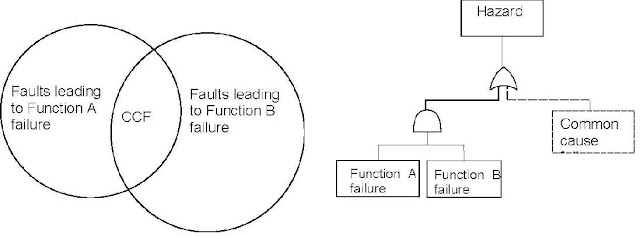It is a single failure that causes a safety function to collaps e.g. a mechanical or logic error in a product as shown below in Figure A.7 from EN 50129.
It can be handled by using redundant systems, inherited charactheristics of components, safety analysis, independent reviews, FRACAS system, etc.

Interpretation
Common causes failures can e.g. be a sleeping tricky error in Function A that cause a dramatic failure in Function B.
If we have installed hundreds of systems we have a possibly accident.
Train fleet example:
Let’s say the developer of a diesel traction system in a train uses the exhaust gas to power a turbo. The turbo powers an air inlet compressor. The compressed air enters the combustion chamber.
A hose clamp on the air tubes are under dimensioned, nevertheless the design passes design reviews and burn-in tests.
The hose clamp is slowly loosened during operation and this causes a decrease of air in the combustion chamber that again causes an overheated exhaust gas that again causes the turbo to overheat and crack and finally cause an oil leakage in the turbo driven power transmission to the compressor located near the exhaust pipe.
The operational staff reports of occasional small fires in the turbo driven power transmission, the maintenance staff discovers the cracked turbo, and it is concluded that cracked turbo's must be changed.
In this case we have an undisclosed common cause failure in the train fleet (the loose hose clamp).
One day, under the right circumstances, the oil leakage will cause a larger fire. If the daily train route furthermore passes a tunnel we might end up with a "fire in train in tunnel" scenario.
Interlocking logic example:
See "Quick guide to safety management based on EN50126"
Next chapter >> 4.6 Safety Integrity Levels (SIL)
Focus on the Source
See "Quick guide to safety management based on EN50126"





Ingen kommentarer:
Send en kommentar